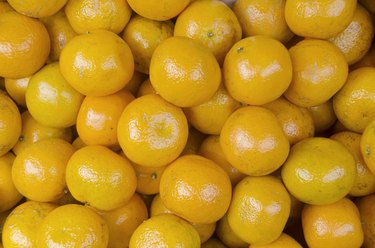
Also known by their original name, ponkan, honey oranges are the most widely grown Mandarin orange in the world. Ponkan have a distinctive oblate shape and salmon-orange colored pulp, with a golden skin. The thick skin peels away easily to reveal juicy, aromatic segments with few seeds. Common throughout India and Southeast Asia, honey oranges are a versatile fruit, ready for juicing, salads or cooking.
Juicing Favorite
Video of the Day
In China almost 95 percent of orange production is allocated to fresh juice, most notably honey oranges, which are perfect for juicing. Although the juice is slightly sharp with plenty of citrus flavor right after harvesting, it soon mellows. Expect these Mandarins to decay more quickly than most oranges, typically within two weeks. Hand-squeezed honey oranges make a zesty, fresh alternative to carton juices with less pulp, easy-to-remove seeds and a clean, citrus taste. With their soft, fibrous pulp, ponkan are also conducive to eating straight out the skin as a snack, and are sold at the roadside for that reason across South Asia.
Video of the Day
Cooking Uses
Squeeze the juice from honey oranges, remove any seeds and combine with olive oil to create a light but citrusy vinaigrette that balances well with full fat creamy cheeses, such as deep fried Camembert over salad greens. For a further flourish, scatter orange segments into a green salad to add a tropical touch. To reveal the orange's color fully, some cooks go the extra step by paring away the membrane of each segment to expose the numerous juice-engorged, translucent pods beneath. The ponkan's thick, pulpy peel makes it ideal for marmalade, with only the seeds discarded. The orange can be juiced first and the pulp reserved, before boiling the peel until it is soft and then shredded. Once refrigerated and set, the marmalade has a tangy, sweet flavor with the all-important trace of bitterness.
Asian Marinade
To give an Asian twist to grilled or BBQ dishes, honey orange makes an excellent marinade, coupled with regional flavors including soy sauce, ginger and honey. Use as a marinade for steak, shrimp, salmon, chicken or ham. The citric acid in the orange has a tenderizing effect that is ideal for slow-cooked meat cuts, while the hints of sweetness complement the stronger flavors in char-grilled meats and neutralize the raw aromas in pork and chicken cuts.
Other Uses
Presented in decorative trays, ponkan are given as gifts in Taiwan and Singapore during the holidays, especially Chinese New Year, since their golden color are thought to evoke royalty, and their shape imitates the circle of life. On a more practical level, dried honey orange peel, like many other citrus fruits, serves as an effective kitchen deodorizer, particularly in dealing with fishy or mildew smells. Cut some peel up, let it dry and place in cupboards, drawers and the refrigerator. The essential oils in the peel are a natural deodorizer.
- Citrus Variety: Ponkan Mandarin
- Purdue University, Center for New Crops and Plant Products: Mandarin Orange
- Council of Agriculture, Executive Yuan: Ponkan
- Appetite: Deep Fried Camembert with Ponkan Vinaigrette
- Los Angeles Times: Mandarins with Lavender and Honey
- Taipei Representative Office in Singapore: Taiwan Ponkan Mandarin Oranges and Persimmons Available in Singapore
- Just Fruits and Exotics: Citrus
- FAO Corporate Document Repository: The Past, Present and Future of China’s Citrus Industry
- Today: Honey Orange Marinade and Other Recipes to Step Up Your BBQ
- Reach: Preserving Your Own Food, Making Fruit Marmalade
- Food Recap: Santunis and Ponkan Peelings as Deodorizer
- Los Angeles Times: Tracking Down the Parents of Sweet Orange